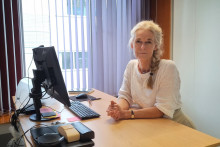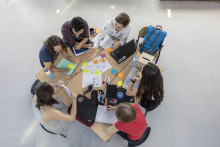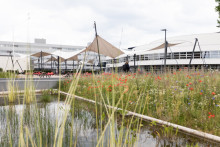Van der Molen is a lecturer in Technology and Sustainable Development, part of the Center for Clean Technology and Environmental Policy (CSTM). The group deals with themes of governance and natural resources, focusing primarily on policy. Van der Molen concentrates more and more on conflicts and the role of natural resource management in the larger conflict and is also interested in conflict prevention, reconciliation, and mechanisms to create dialogue or start peace-building.
Most recently Van der Molen enrolled in a course called the REACT Project (Training of Experts for Rapid Cooperation and Assistance for Conflict Prevention Operations, Crisis Management, and Post-conflict Rehabilitation) at the Helsinki Institute of Spain. Founded after the Helsinki Act of 1975 which set the pace for organizing security and cooperation in Europe, in 2003 the institute recognized a need for `rapid training of experts for international missions' and organized an `intensive training program with very practical orientation.'
About 20 participants from as far away as Nigeria, Australia, and the Dominican Republic took part. The lecturers came from universities, OSCE, the Spanish Ministry of Defense, various UN departments and international truth commissions. The different backgrounds of the lecturers and participants ensured that there were `many different perspectives' often resulting in interesting debate.
Van der Molen recounts that the participants discussed `conflicts in Africa, case studies of rule of law, and democratic processes. The intensive training program included topics such as the requirements for effective governance, relevant international humanitarian law, negotiation techniques, and international criminal courts and tribunals.'
Role playing - for example, mission officers at branch offices in Congo arrive at work and are told that 12,000 refugees are on their way; every five minutes, more information and tasks are given - helped Van der Molen grasp how quickly one must be able to think, delegate, and come up with contingency plans all within the scope of international law and local practicalities.
The course was intended to train civil experts willing to go on missions relating to conflicts, democratic processes, or election monitoring. Why was Van der Molen there? She explains, `I want to do not only research and teaching, I also want to be more involved, more hand-on. I want to help. A researcher is theoretically neutral, keeping to the sidelines, but I think that my research can benefit from my active participation.' Because of her teaching responsibilities at the UT, Van der Molen is seeking only short-term missions, such as election observations.
This style of research is called action research. Action Research International, a refereed online journal based in Southern Cross University in Australia, describes it as a research methodology which `pursues action (or change) and research (or understanding) at the same time.' Consequently it is `an emergent process which takes shape as understanding increases.' Van der Molen gives the example of minority rights in southeastern Europe. Interviewing an administrator about the government's treatment of Roma people yields only certain information. However, involvement in a program dealing directly with both the administration and the Roma people offers firsthand insight as to how much resistance or cooperation takes place. From there, the researcher has a far better chance of being able to effect change. Van der Molen admits that this style of research is not practiced much at the UT, `One loses neutrality as a researcher, but gains valuable insight into power relations and particular mechanisms or processes which otherwise would remain hidden.'
In addition to being one step closer to embarking on a mission, Van der Molen remarks, `The course made me more critical of the role which can be played by international organization in managing conflicts - not skeptical, but aware of the difficulties.'

This picture has token immediately after the graduation ceremony. Irna van der Molen is in back, on the right, next to a Nigerian student. The woman in front right with the dress and pearls is the President of Helsinki España, Princess Monika zu Loenwenstein-Werteim-Rosemberg.







